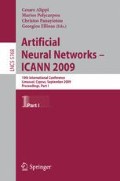Abstract
Recent cognitive modeling studies suggest the effectiveness of meta-heuristic optimization in describing human cognitive behaviors. Such models are built on the basis of population-based algorithm (e.g., genetic algorithm) and thus hold multiple solutions or notions. There are, however, important yet unaddressed issues in cognitive mechanisms associated with possession of multiple notions. The issues we address in the present research is about how multiple notions are organized in our mind. In particular, we paid close attention to how each notion interact with other notions while learning a new concept. In so doing, we incorporated Particle Swarm Optimization in a cognitive model of concept learning. Three PSO-based concept learning models were developed and compared in the present exploratory cognitive modeling study.
Access this chapter
Tax calculation will be finalised at checkout
Purchases are for personal use only
Preview
Unable to display preview. Download preview PDF.
References
Anderson, J.R.: The Adaptive Character of Thought. Lawrence Erlbaum, Hillsdale (1990)
Anderson, R.C., Pichert, J.W.: Recall of previously unrecallable information following a shift in perspective. Journal of Verbal Learning and Verbal Behavior 17, 1–12 (1978)
Engelbrecht, A.P.: Fundamentals of Computational Swarm Intelligence. Wilely, Chichester (2005)
Gigerenzer, G., Todd, P.M., The ABC Research Group: Simple heuristics that make us smart. Oxford, New York (1999)
Higashi, H., Iba, H.: Particle Swarm Optimization with Gaussian Mutation. In: Proceedings of the IEEE Swarm Intelligence Symposium, pp. 72–79 (2003)
Kennedy, J., Eberhart, R.C., Shi, Y.: Swarm Intelligence. Morgan Kaufmann, San Francisco (2001)
Matsuka, T., Corter, J.E.: Observed attention allocation processes in category learning. Quarterly Journal of Experimental Psychology 61, 1067–1097 (2008)
Matsuka, T., Sakamoto, Y., Chouchourelou, A.: Modeling a flexible representation machinery of human concept learning. Neural Networks 21, 289–302 (2008)
Matsuka, T., Sakamoto, Y., Chouchourelou, A., Nickerson, J.V.: Toward a descriptive cognitive model of human learning. Neurocomputing 71, 2446–2455 (2008)
Author information
Authors and Affiliations
Editor information
Editors and Affiliations
Rights and permissions
Copyright information
© 2009 Springer-Verlag Berlin Heidelberg
About this paper
Cite this paper
Matsuka, T., Honda, H., Chouchourelou, A., Kiyokawa, S. (2009). On the Knowledge Organization in Concept Formation: An Exploratory Cognitive Modeling Study. In: Alippi, C., Polycarpou, M., Panayiotou, C., Ellinas, G. (eds) Artificial Neural Networks – ICANN 2009. ICANN 2009. Lecture Notes in Computer Science, vol 5768. Springer, Berlin, Heidelberg. https://doi.org/10.1007/978-3-642-04274-4_70
Download citation
DOI: https://doi.org/10.1007/978-3-642-04274-4_70
Publisher Name: Springer, Berlin, Heidelberg
Print ISBN: 978-3-642-04273-7
Online ISBN: 978-3-642-04274-4
eBook Packages: Computer ScienceComputer Science (R0)

